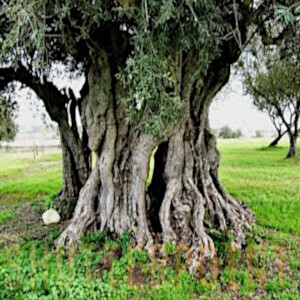


I think that as Jesus moved towards the cross, his vision became focussed exclusively on those things that mattered most. The remaining time could be counted in minutes. So we must pay particular attention to the prayer that Jesus prayed in Gethsemane.
He asked our Father to give his disciples the kind of unity that exists within the Godhead.
He goes on later to pray for all of us who follow him. You and me …
The phrase is repeated – that they may be one just as we are one. The unity between us, across denominational divide, across class divide, across national divide, across attitudinal and educational divide, is that we are one, as God is one. This begs the question, “How is God one?” What characterises the unity of God?
Firstly, the unity of God is organic, not organisational.
Much energy is spent trying to bring together organisations. I think this is largely a waste of time. I would rather we recognised that because we have the same Father, and we have been born again into the same family, because we breathe the same Breath of life, we are already organically united. We are branches of the same vine. Let's recognise that and allow it to modify our allegiances.
The unity of God is diverse, not clonal.
The Father is leading, powerful, awesome, overwhelming. The Son is humble, serving, caring, tender. The Spirit is creative, dynamic, disruptive. I may be pushing the distinctions, but there are undeniable characteristics here.
Similarly, we are a body of many diverse parts – toes, fingers, eyes, ears, etc. The church needs treasures, pianists, singers, speakers, listeners, carers, watchers, waiters, prayers.
The unity of God is relational, not conceptual.
Jesus introduced the idea of God as “Dad”. The OT tradition has God as ‘Father of the nations’. It was truly shocking when Jesus evidenced God as a personal “Dad”.
When you pray, say ‘Dad’”! Abba
Augustine is the man credited with formalising many of our theological ideas. But, although theological doctrine can be seen a something dry, for Augustine, theology was never dry, to be extracted, analysed, ordered and put in a holy jar. It was part of his relationship with God.
If our theology does not lead us towards radically new community, centred on right relationships, if it does not lead us into relationship with God, then maybe we're too conceptual!
Our western thinking habits lead us to abstracting the stories of Jesus into pure truth, sterile principles that can be treated like maths.
We should have the passion of Augustine who wrote,
"You called, and shouted, and burst my deafness. You flashed, shined, and scattered my blindness. You breathed odours, and I drew in breath, and panted for You. I tasted, and I hunger and thirst for You. You touched me and I burned for your peace."
The unity of God is absolute, not fragile.
There is no danger of God fragmenting or there being any internal warfare within God’s being. And there is an absolute unity between that spiritual man or woman that is inside us, that born-again part, a unity with every other Christian on the planet.
The extent to which we love other Christians far and wide, is the extent to which that spiritual man or woman is alive in us.
In that sense, we have no need to get more united. Instead we need to let that new person inside us, who is already organically, relationally, absolutely united do the living.
The unity of God expresses serving, not controlling.
One of the mysteries of God is why he is expressed in the Father, Son and Holy Spirit. Well I cannot claim any special knowledge about this, but it seems clear to me that a single individual, can only be self-serving, and selfish. But we know that God is loving, without being self-serving, and this is how this is possible within God. One part of the Godhead serves another part.
We can see this in the ministry that Jesus receives from the angels after his temptation – angels commanded by the Father to tend to Jesus needs. We can see this in the way Jesus serves the Father day by day, in listening to what he wanted, and saying what he told him.
Do you see it as a privilege to serve? I hope so. It is not a burden, or a drag. It is not inconvenient or intrusive. It is our honour, it is our bread and butter – to serve others, to be poured out for others, because in individual service is not only individual greatness but this is how unity is expressed.
The established existing spiritual unity of Christians is not a cop-out! Jesus and the NT writers encourage us to express what is already spiritually real, by a pragmatic, down-to-earth caring and serving life-style.
As Paul says, with an awareness of our unity, we will be like a body that instinctively cares for itself.

